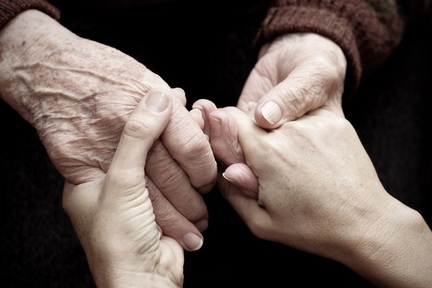End of life care should be a priority for the new Conservative Government
Nearly two-thirds of people in Britain would like to see end of life care being made a priority by the new Tory Government, according to a new study.

The ComRes research commissioned by the Dying Matters Coalition, also found that three-quarters of people (75 per cent) agree that providing end of life care should be a fundamental part of the work of the NHS.
A huge part of the problem is that discussing dying and making end of life plans remains a taboo for millions of people in the UK.
The Dying Matters Coalition found that although a third of British adults (32 per cent) think about dying and death at least once a week, 72 per cent of the public believe that people in Britain are uncomfortable discussing dying, death and bereavement.
Only 35 per cent of the public say they have written a will, 32 per cent that they have registered as an organ donor or have a donor card, 31 per cent that they have taken out life insurance and 27 per cent that they have talked to someone about their funeral wishes.
In addition, only seven per cent have written down their wishes or preferences about their future care, should they be unable to make decisions for themselves.
Claire Henry, chief executive of the Dying Matters Coalition said: “We need to change the nation’s approach to dying, so that all of us become better at making our end of life wishes known and asking our loved ones about theirs. Talking about dying and planning ahead may not be easy, but it can help us to make the most of life and spare our loved ones from making difficult decisions on our behalf or dealing with the fallout if we haven’t got our affairs in order.”
Professor Mayur Lakhani, a practising GP and chair of the Dying Matters Coalition added: “There are encouraging signs that talking about dying is becoming less of a taboo than previously, but too many people are continuing to avoid facing up to their own mortality and are not putting plans in place. The public and health professionals alike need to become more comfortable talking about dying and discussion options for end of life care. We know that many people have strong views about their end of life wishes, but unless they talk about them and plan ahead they are unlikely to be met.”
It seems parents of children under 18 are particularly unprepared, with less than a third (28 per cent) saying they had written a will, risking wishes about who would look after the children and inheritance not being met.
Just 40 per cent of parents who had children under 18 living with them said they had ever taken out life insurance.
Despite this failure to talk about dying and plan ahead, 71 per cent of the public agree that if people in Britain felt more comfortable discussing dying, death and bereavement it would be easier to have our end of life wishes met.
The sixth annual Dying Matters Awareness Week runs from 18-24 May 2015. Dying Matters members across the country will be hosting hundred of events and activities, including death cafes, arts events, discussion events and open days www.dyingmatters.org/events.
Latest News
 29-Jul-24
Dementia Bus gives carehome.co.uk staff insight into life with dementia
29-Jul-24
Dementia Bus gives carehome.co.uk staff insight into life with dementia
 01-Mar-24
Find out the top care homes in 2024
01-Mar-24
Find out the top care homes in 2024
 21-Mar-23
UK's top care homes in 2023 revealed
21-Mar-23
UK's top care homes in 2023 revealed
 03-Jan-23
carehome.co.uk launches free care helpline
03-Jan-23
carehome.co.uk launches free care helpline
 13-Dec-22
5 mins with Emily Whitehurst, chief operating officer for Constantia Healthcare
13-Dec-22
5 mins with Emily Whitehurst, chief operating officer for Constantia Healthcare